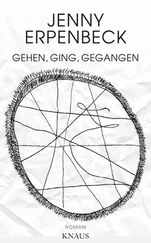Jenny Erpenbeck - The End of Days
Здесь есть возможность читать онлайн «Jenny Erpenbeck - The End of Days» весь текст электронной книги совершенно бесплатно (целиком полную версию без сокращений). В некоторых случаях можно слушать аудио, скачать через торрент в формате fb2 и присутствует краткое содержание. Год выпуска: 2014, Издательство: New Directions Publishing, Жанр: Современная проза, на английском языке. Описание произведения, (предисловие) а так же отзывы посетителей доступны на портале библиотеки ЛибКат.
- Название:The End of Days
- Автор:
- Издательство:New Directions Publishing
- Жанр:
- Год:2014
- ISBN:нет данных
- Рейтинг книги:4 / 5. Голосов: 1
-
Избранное:Добавить в избранное
- Отзывы:
-
Ваша оценка:
- 80
- 1
- 2
- 3
- 4
- 5
The End of Days: краткое содержание, описание и аннотация
Предлагаем к чтению аннотацию, описание, краткое содержание или предисловие (зависит от того, что написал сам автор книги «The End of Days»). Если вы не нашли необходимую информацию о книге — напишите в комментариях, мы постараемся отыскать её.
The End of Days — читать онлайн бесплатно полную книгу (весь текст) целиком
Ниже представлен текст книги, разбитый по страницам. Система сохранения места последней прочитанной страницы, позволяет с удобством читать онлайн бесплатно книгу «The End of Days», без необходимости каждый раз заново искать на чём Вы остановились. Поставьте закладку, и сможете в любой момент перейти на страницу, на которой закончили чтение.
Интервал:
Закладка:
Would you like to come some time?
While she was slicing through the stack of paper at one go, he wiped his damp cheek with the back of his hand and told her that his Communist cell always met on Wednesdays.
I see.
So it was possible to sacrifice your health and possibly even your life for something other than love, you could keep yourself preserved until it was time to throw your life and body into the jaws of time for a good cause.
But in Hungary it’s all over already, she said, meaning the Hungarian Soviet Republic.
We’re learning, he said, and the world still has no idea what is happening here, but soon it will be astonished.
It would also never again be possible to tell for sure whether he was laughing so hard there were tears rolling down his cheeks or just laughing, she thought, and she began to wrap the freshly sliced stack of paper in paper.
The comrade who is me and Comrade B. are walking down Tverskaya when the comrade who is me sees him. He is walking on the other side of the street. He waves to the comrade who is me. The comrade who is me waves as well, and I ask, Shouldn’t we call him over to our side of the street? For God’s sake, what if someone sees us! If someone sees us, he’ll see he was only waving to the comrade who is me. I beckon, and he comes over, B. turns away. We stroll up and down Strastnoy several times. The conversation is superficial. We discuss lighting, the use of a greenish light. His tone is cordial. We spend approximately a quarter hour together. Then he says goodbye. Should it now be considered an error that the comrade who is me and Comrade B. spoke to him? In any case, we spoke to him.
One Wednesday, for the first time in her life, she met people who didn’t just grumble about how awful everything was, but instead clearheadedly investigated why this machine known as progress kept undermining the well-being of mankind.
Otherwise, what was the point of being young in a time like this when progress itself was still young, one of them asked — a man the others called Comrade H. — and with a quick toss of his head, he flipped a strand of hair off his forehead, a gesture she would later come to know so well.
It is not enough to be eighteen years old.
Now that mankind had finally, thanks to the inventions of the modern age, acquired the means to raise itself above the limitations imposed by the need for survival, it was now time for them to ensure that mankind was actually taking advantage of these means, cried a pudgy comrade known as A. and he got to his feet to describe the rising up of humanity with a powerful sweep of his arm. And not, he went on, so as to pile up immeasurable wealth for just a few individuals, not so as to conquer new markets and cheaper sites of production through the subjugation of the colonies, to simply redistribute natural resources in the next war. No! We are standing at a beginning, he exclaimed, not somewhere in the middle, but right at the starting point — and again he scooped up a mighty armful of air and shoved this air across to the middle of the table, dispersing the cloud of smoke that had gathered there and sending it swirling in all directions. Then he sat down again to roll himself a fresh cigarette.
It is not enough to be eighteen years old.
Comrade U., who spoke quietly so that people would listen to her, said, nearly whispering, that the distribution of the generated revenues would have to be regulated, since the moment it was possible for an individual to enrich himself, that’s what he’d do.
Precisely, H. said, adding that it was in any case high time to take private ownership to the cleaners, time for mankind to become one with itself, on a truly massive scale! Those who have never been allowed to use their teeth for anything more than biting their tongues should now be fed and allowed to digest and grow — even to take a crap! he shouted, laughing as he bared his own teeth. Flesh to flesh, he cried, flipping back his strand of hair.
Beautiful Z. smiled, and Comrade U., once more speaking at the edge of audibility, opined that Comrade H. was perhaps going a bit too far, but that in principle he was probably not wrong: the massively widespread alienation of labor could only be a preliminary phase that would eventually lead to a world in which the masses would also benefit from these massive quantities of labor.
Well, that’s no laughing matter, G. said, and his eye started watering again, making it impossible to tell whether he was laughing so hard there were tears rolling down his cheeks or perhaps crying, or neither of the two; no laughing matter, he said, and besides: If we can tame Nature, which completely surrounds us, surely we can prevent human selfishness from casting us back into an animal state.
No, youth no longer existed so one could squander one’s youth, or simply wait for the years to pass until one could eventually slip into old age as into rags that others had worn to shreds. It no longer existed for being ground down to make up for the failings of an older generation. Now the point of youth was to be thrown away: for a new world such as the world had never seen before.
They were all in a good mood, they were singing and drinking coffee.
When I was there, all they were doing was dancing. I can’t dance, it was a dull two hours for me.
We showed up and played cards. We didn’t have any particular conversations.
They were already having coffee. There was no discussion of politics at all.
V. sometimes turned up at my apartment, which I took to mean that he liked to smoke and drink for free. I saw no political motivation for his behavior.
And so V. was in my room on several occasions, mainly we talked about bygone days. In early November 1935 I had one last brief encounter with him on the street.
After the fall of 1931 I never saw him again. We weren’t at all close, neither personally nor politically.
Once he came and sat with me as I was drinking a glass of beer. He made a very bad impression on me. I never saw him again.
He can’t hold his drink at all. Usually the first glass is enough for him.
Sometimes he’s just pretending!
That’s right, I’ve seen that.
Did Comrade Br. ever run into Comrade T. at V.’s apartment?
Not that I recall, but it’s always possible. I’d rather err on the side of assuming he did.
Why do you consider this a possibility?
According to what I’ve heard, the two of them knew each other.
S., L., M., and O. were once there too. A female journalist from Sweden was there, then K. and Sch. Once H. with his wife, and besides them, Comrade R., and Ö. with his wife — I think that’s all of them.
I was there once, too.
Oh, right, Fr. and also C.
Pretty much everyone was tipsy.
I consider it my duty to emphatically put a stop to these evenings, no matter how festive. When alcohol is being consumed, it is impossible to monitor whether a political remark is being made that can no longer be monitored.
I was at his apartment once on New Year’s Eve when the entire place was full and there were a large number of comrades in attendance.
Was I there?
No.
Was I there?
No.
Me?
No.
Once I went to his apartment because he had invited me ten times.
I was off traveling all the time, so I didn’t have any sort of relationship with V. at all.
That V. managed to escape being unmasked by us as two-faced until the very end is of course quite disconcerting. The moral I draw from this is that his behavior was not entirely correct.
Читать дальшеИнтервал:
Закладка:
Похожие книги на «The End of Days»
Представляем Вашему вниманию похожие книги на «The End of Days» списком для выбора. Мы отобрали схожую по названию и смыслу литературу в надежде предоставить читателям больше вариантов отыскать новые, интересные, ещё непрочитанные произведения.
Обсуждение, отзывы о книге «The End of Days» и просто собственные мнения читателей. Оставьте ваши комментарии, напишите, что Вы думаете о произведении, его смысле или главных героях. Укажите что конкретно понравилось, а что нет, и почему Вы так считаете.












